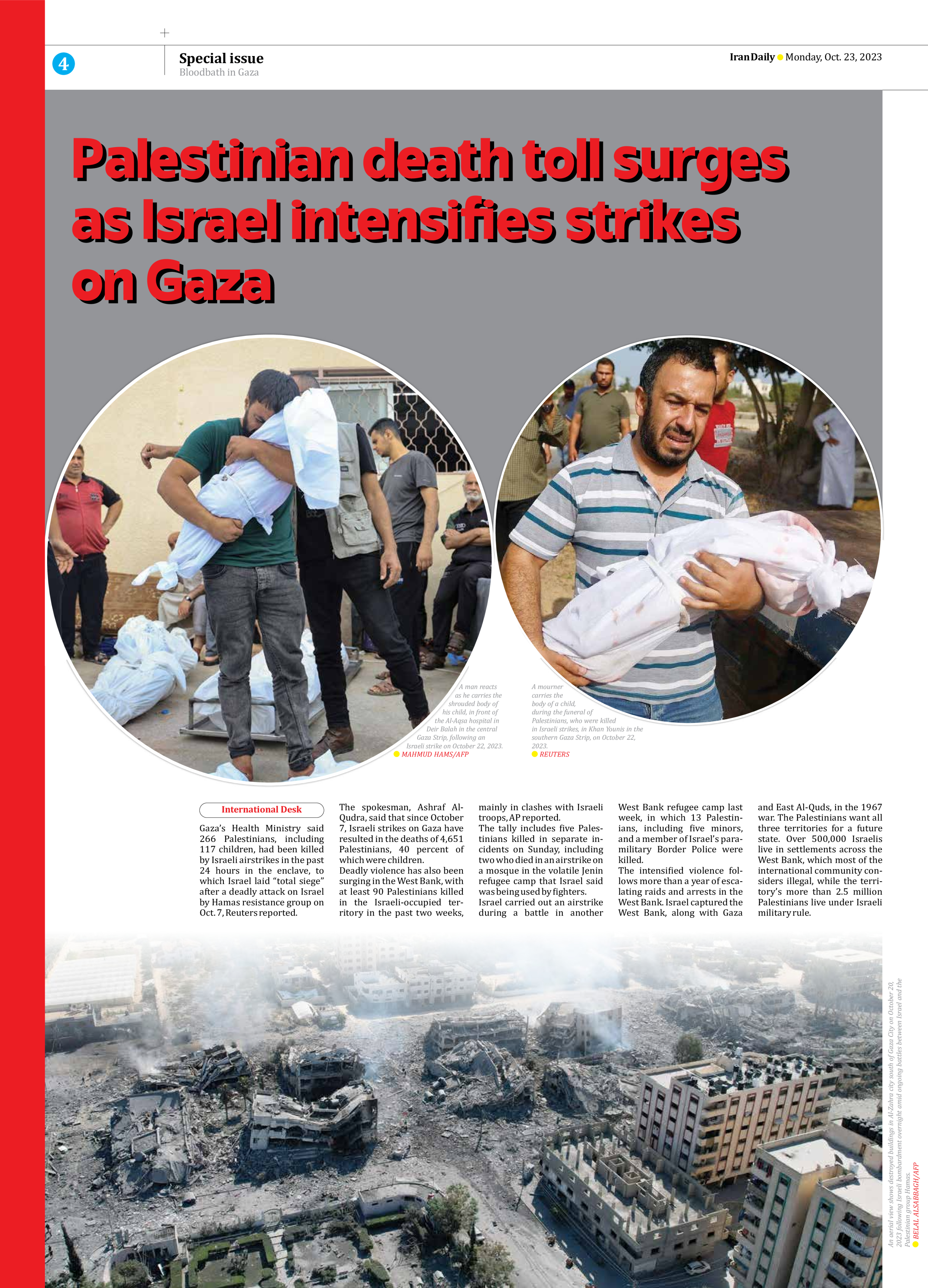
Palestinian death toll surges as Israel intensifies strikes on Gaza
Gaza’s Health Ministry said 266 Palestinians, including 117 children, had been killed by Israeli airstrikes in the past 24 hours in the enclave, to which Israel laid “total siege” after a deadly attack on Israel by Hamas resistance group on Oct. 7, Reuters reported.
The spokesman, Ashraf Al-Qudra, said that since October 7, Israeli strikes on Gaza have resulted in the deaths of 4,651 Palestinians, 40 percent of which were children.
Deadly violence has also been surging in the West Bank, with at least 90 Palestinians killed in the Israeli-occupied territory in the past two weeks, mainly in clashes with Israeli troops, AP reported.
The tally includes five Palestinians killed in separate incidents on Sunday, including two who died in an airstrike on a mosque in the volatile Jenin refugee camp that Israel said was being used by fighters.
Israel carried out an airstrike during a battle in another West Bank refugee camp last week, in which 13 Palestinians, including five minors, and a member of Israel’s paramilitary Border Police were
killed.
The intensified violence follows more than a year of escalating raids and arrests in the West Bank. Israel captured the West Bank, along with Gaza and East Al-Quds, in the 1967 war. The Palestinians want all three territories for a future state. Over 500,000 Israelis live in settlements across the West Bank, which most of the international community considers illegal, while the territory’s more than 2.5 million Palestinians live under Israeli military rule.
Israel to step up
bombardment
The Israeli military announced on Saturday it was stepping up its bombardment of Hamas-controlled Gaza just hours after the first aid trucks arrived from Egypt, bringing desperately needed relief to civilians in the war-torn enclave.
The military said it aimed to reduce the risks its troops would face as they enter Gaza in the next phase of the war, which it launched on Palestinians after the Hamas resistance group carried out the deadliest attack in Israel’s history. More than 1,400 people have been killed in Israel since the war began.
Second aid convoy
enters Rafah
The Israeli regime also imposed a total blockade on Gaza in response to the Hamas attack. The Rafah crossing had been out of operation since shortly afterwards, and bombardments on the Gaza side had damaged roads and buildings.
A second convoy of aid trucks entered the Egyptian side of the Rafah border crossing on Sunday, heading towards the Gaza Strip, according to Egyptian security and humanitarian sources at Rafah.
A total of around 19 trucks carrying medical and food supplies had been inspected by UNRWA, the UN’s Palestinian refugee agency, the sources said. The first convoy of 20 trucks of badly needed supplies entered Gaza on Saturday.
UN officials say a higher continuous pace of at least 100 trucks a day would be required in Gaza to cover urgent needs. Before the outbreak of the most recent conflict, several hundred trucks had been arriving in the enclave daily.
‘Situation is tragic’
Deprived of electricity and water under Israeli siege, Gazans in the southern town of Khan Younis said they were struggling to feed their children, forming long queues to get bread made scarcer by power blackouts and a lack of flour.
“We are suffering extremely, waiting since dawn to get bread. If this continues for two more days it will be catastrophic,” said Saleh Skafi, a father of four from north Gaza now sheltering in Khan Younis. “The situation is tragic.”
Moreover, Israel has refused to allow in fuel as part of aid shipments lest it ends up in Hamas’s hands.
“Without fuel, the humanitarian response will stop. There will be no water, no functioning hospitals and bakeries,” said Philippe Lazzarini, head of the UNRWA. “This cannot and should not happen.”
US beefing up military presence
Fears over the risk of the Israel-Hamas war mushrooming into a wider Middle East conflict rose on Sunday with the US sending more military assets to the region as Israel pummeled Gaza anew, and deadly clashes along its border with Lebanon intensified, Reuters reported.
US Defense Secretary Lloyd Austin said Washington would send more military assets to the Middle East in support of Israel and strengthen the US defense posture in the region.
A Terminal High Altitude Area Defense (THAAD) system and additional Patriot air defense missile system battalions will be sent to the region and more troops put on standby, Austin said.
Washington has already deployed a significant amount of naval power to the Middle East in recent weeks, including two aircraft carriers, support ships and about 2,000 Marines.
Israel targets
Syria, Lebanon
In neighboring Syria, Israeli missiles hit Damascus and Aleppo international airports early on Sunday, putting both out of service and killing two workers, Syrian state media said.
Along the border with Lebanon, the Hezbollah resistance group has clashed with Israeli forces in support of Hamas in the deadliest escalation of frontier violence since an Israel-Hezbollah war in 2006.
Hezbollah said four fighters were killed in heavy exchanges of fire on Sunday, and another died of wounds sustained earlier, raising to 24 the number of its members killed since Oct. 7.
Lebanese security sources said 11 fighters in Lebanon had also been killed in the volatile border region, alongside four civilians. At least five Israeli soldiers and one civilian have been killed on Israel’s side of the frontier, according to Israeli military reports.







